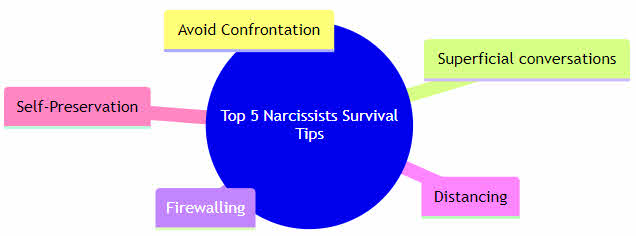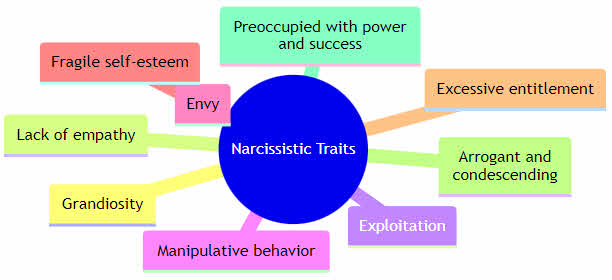Dr. Ramani’s Guide to Emotional Resilience
Once upon a time, in a quiet town, there lived a wise psychologist named Dr. Ramani. She was renowned for her deep understanding of human behavior, particularly in dealing with difficult personalities. In her practice, she often encountered people entangled in the challenging webs of relationships with narcissists.
Narcissist’s Roadmap
Dr. Ramani understood that confronting a narcissist directly was like walking into a maze with no exit. She advised her clients to instead focus on understanding the patterns of such relationships. She likened this to studying a map before embarking on a journey, ensuring one was prepared for the twists and turns ahead.
Creative Strategy for Weathering the Narcissist’s Storm
One of her unique strategies was the Gray Rock Technique. She would tell her clients, “Be like a gray rock, unremarkable and unengaging, when dealing with a narcissist.” This meant keeping conversations superficial, like discussing the weather or the new purple flowers in the neighbor’s garden. This approach was not about forming a deep connection, for that was a path filled with emotional traps, but about self-preservation.
Dr. Ramani also spoke of ‘firewalling’ and radical acceptance. She compared the human heart to a fortress that needed strong walls to protect its precious contents. “Firewalling is about knowing where the limits of a relationship lie,” she would say. “Accept the situation for what it is. Recognize that confronting a narcissist is like throwing stones into the sea – it’s pointless and potentially harmful.”
Firewalling Your Heart Against Narcissistic Intrusions
In her tales of guidance, Dr. Ramani often mentioned the concept of ‘soul distancing’ – a technique to maintain psychological and emotional health. She likened it to being seated next to a stranger on a bus; you acknowledge their presence but do not invest your emotions or personal stories in them. This was particularly important in the era of digital connections, where physical distancing was often not possible.
The most compelling part of her teachings involved dealing with ‘flying monkeys’ – people influenced by the narcissist to act on their behalf. Dr. Ramani warned her clients, “These individuals can be as deceptive as the charming antagonist in our childhood fairy tales. Be cautious and hold onto your reality. Remember, not all who return to your life come with good intentions.”
Insights That Illuminated a Path to Emotional Liberation
Dr. Ramani’s wisdom spread throughout the town, helping many navigate the complex labyrinth of relationships with narcissists. Her message was clear: In the face of such adversity, protecting one’s emotional and psychological well-being was paramount. The residents learned that while they couldn’t control the actions of a narcissist, they could control how they responded and protected their inner peace.
And so, the townspeople lived with a newfound understanding, equipped with the tools to navigate the challenging relationships in their lives. They found strength in Dr. Ramani’s words, embracing self-care and emotional intelligence. The psychologist’s legacy continued to guide them, offering a beacon of hope in their journey towards healthier and more fulfilling relationships.

Top 5 Tips For Dealing With Narcissists
Instead of Arguing or Fighting with a Narcissist, Try These Effective Alternatives
- Avoid Direct Confrontation with Narcissists: It’s futile to call out a narcissist as it leads to no positive outcome. Instead, focus on understanding the patterns of narcissism and managing your own responses.
- Gray Rock Technique: Maintain superficial conversations (like discussing the weather) to avoid deep engagement with a narcissist. This approach, termed “gray rocking,” limits emotional involvement and potential manipulation.
- Firewalling and Radical Acceptance: Adopt a ‘firewalling’ approach, akin to setting strict emotional boundaries, and practice radical acceptance of the situation. Recognize that calling out a narcissist is pointless and could be harmful.
- Distraction and Soul Distancing: Focus on other aspects of life and maintain a psychological distance, or “soul distancing,” from the narcissist. This involves keeping your inner self protected and not engaging deeply with them.
- Handling Flying Monkeys and Self-Preservation: Be cautious of ‘flying monkeys’ (people influenced by the narcissist) and focus on self-preservation. This involves holding onto your reality, managing your responses, and remembering that healing and distancing from narcissistic abuse are crucial for your well-being.
I hope you found this information about Narcissist helpful

Unfortunately, the term “narcissist” can refer to two different things:
- Narcissistic personality disorder (NPD): This is a clinical diagnosis made by a mental health professional. Estimates suggest about 0.5% to 5% of the US population meets the criteria for NPD, with a possible gender bias towards men (50-75%). However, diagnosing NPD can be challenging, and these figures might not fully capture the prevalence of narcissistic traits.
- People exhibiting narcissistic behaviors: This is a broader category that includes individuals who display some, but not all, of the NPD diagnostic criteria. It’s difficult to estimate the prevalence of “narcissistic people” due to the subjective nature of the term and the lack of a precise definition.
Here are some additional points to consider:
- Prevalence varies by context: Studies suggest higher rates of narcissistic traits in certain professions like entertainment, business, and law.
- Self-reported narcissism: Studies using self-assessment tools show higher rates of narcissistic traits compared to clinical diagnoses, but may not be fully reliable.
- Cultural factors: Different cultures have varying values and norms, impacting how narcissism is perceived and expressed.
It’s important to remember that these statistics are estimates and don’t necessarily apply to any specific individual. If you’re concerned about someone’s behavior, seeking professional help is always the best course of action.
Here are some resources where you can find more information on narcissism:
- National Institute of Mental Health: https://www.ncbi.nlm.nih.gov/books/NBK556001/
- American Psychological Association: https://dictionary.apa.org/narcissistic-personality-disorder
- The Jed Foundation: https://jedfoundation.org/

I did some Money Coaching for a while … Have you seen: “The Hidden Secrets of Money” series? (Talk about GASLIGHTING!) It exposes The Biggest con in history – how fake currencies control your time and life. —> Watch the series here on my website.
Related:
Narcissistic Personality Disorder An Entrepreneur’s Perspective
